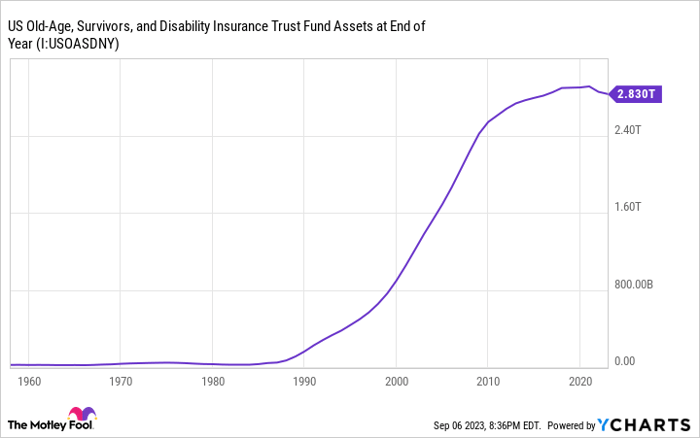I saw this from the "Motley Fool", they do a lot of financial stuff and normally to me are apolitical or as politically neutral in these times anyway.
I always had believed 2 things one. To finance both the war in Vietnam and the "Great Society Programs" he had his minions in congress raid the Social Security fund to hide the true cost of both from the American people and pack it with "IOU's" so the cost wasn't readily apparent. The second one is that if they kept those that never paid into the system from drawing from it, there wouldn't be an insolvency issues. I also believe that by the time I retire, there will be an "Means Test" and since I scrimped my present to fund my future, I will be ineligible to draw from what I call that great "Ponzi" What I mean is that if anybody ran SS like the government ran it, they would be in jail.
Among America's numerous social programs, none lifts more people out of poverty each year than Social Security. As of 2021, the Center on Budget and Policy Priorities estimates that 21.75 million people, including nearly 15.4 million seniors aged 65 and over, were being lifted above the federal poverty line due to their monthly Social Security benefit.
Unfortunately, this vital program that provides benefits to approximately 66.7 million people each month -- 49.6 million of which are retired workers -- finds itself on shaky ground.
The 2023 Social Security Board of Trustees Report estimates that America's top retirement program is facing a funding obligation shortfall of a whopping $22.4 trillion through 2097. In plain English, the Trustees believe the Social Security program won't collect enough revenue to meet outlay obligations (benefits and administrative expenses) over the next 75 years.
What's more, the Trustees Report estimates that the asset reserves -- the excess revenue collected since inception -- of the Old-Age and Survivors Insurance Trust Fund (OASI) could be exhausted by as early as 2033. Should this happen, sweeping benefits cuts of up to 23% may be necessary for retired workers and survivor beneficiaries to sustain their payouts through 2097 without the need for any additional reductions.
It's not the rosiest of outlooks for a program that's crucial to the financial well-being of our nation's retired workers. However, the reason(s) behind this $22.4 trillion long-term funding obligation shortfall may not be what you think.
Has Congress pilfered trillions of dollars from Social Security's coffers?
Just as the sun rising in the Eastern sky every day is a fundamental truth, every prominent Social Security article on the internet with a comments section is destined to be filled with claims that the program's shaky foundation is the result of "Congress stealing trillions from Social Security and not paying interest on what they've taken."
This thesis claims that if Congress were to return the trillions they've taken, with interest, Social Security would no longer be facing a budgetary shortfall. But is there any truth to these claims?
When Social Security was signed into law in the mid-1930s, it required that the program's asset reserves be invested in special-issue bonds and certificates of indebtedness. In other words, all excess revenue that isn't being disbursed to eligible beneficiaries is invested in super safe government bonds that bear an interest rate that generates the program interest income.
Does the government use the money it receives from these bonds for various line items, including spending on defense, education, healthcare, and so on? Absolutely. But has this money been "stolen" by Congress? Nope. Every cent is accounted for via the bonds and certificates of indebtedness.
In fact, the Social Security Administration publicly updates its portfolio of investment holdings each month. As of the end of July 2023, the program held $2,856,838,557,000 in asset reserves, with an average interest rate of 2.396%. Extrapolated out 12 months using 2.396% as the average interest rate would yield $68.45 billion in net interest income for Social Security.
Let me offer a more relatable way you can think about how Social Security treats its asset reserves. Imagine you have $1,000 in cash in your pocket and you deposit this cash at your local bank. Your bank has no intention of sitting on this cash and letting it collect dust. Rather, it's going to use your cash, along with the cash of other depositors, to generate interest income and/or make loans. The bank hasn't stolen your deposit, and your $1,000 is there anytime you want to take some or all of it out.
The same premise holds true for Social Security. The U.S. government is responsible for making interest payments to the program, and every previous bond maturity throughout history has been repaid in full. Nothing has been stolen; interest is being paid; and not a penny is missing.
As one final note, if, hypothetically speaking, the government were forced to repay its nearly $2.86 trillion in outstanding bonds and certificates of indebtedness, Social Security would miss out on tens of billons in annual interest income. In short, it would be in far worse financial shape with its excess cash simply collecting dust in the proverbial vault and losing purchasing power to steadily rising prices for goods and services.
Here are the real reasons Social Security's foundation is buckling
The idea of Congress stealing from Social Security and not paying interest is a complete myth. There are, however, tangible reasons for Social Security's struggles, many of which can be tied to long-running demographic shifts.
To begin with, the U.S. fertility rate has effectively fallen to a record low. The "fertility rate" describes the number of births a woman would be expected to have over her lifetime. As recently as 2007, this figure was above 2. By 2021, the U.S fertility rate had dropped more than 20% from where it stood in 2007.
The reasons behind fewer U.S. births are many and include, couples waiting longer to get married, fewer unplanned pregnancies, better access to contraceptives, and even economic uncertainty (e.g., the Great Recession and COVID-19 pandemic). Fewer people in the workforce a generation from now means an even lower worker-to-beneficiary ratio for Social Security.
A more-than-halving in net immigration into the U.S. is another key problem for Social Security. Legal immigrants tend to be younger, and therefore spend decades in the labor force generating much-needed payroll tax revenue for the program. But over the past quarter of a century, net legal immigration has declined by 57%.
Also, to take another myth off the table, undocumented workers positively contribute to Social Security via the payroll tax, but are ineligible to receive a penny back in traditional benefits.
Income inequality is another front-and-center issue for Social Security. In 2023, all earned income (wages and salary, but not investment income) between $0.01 and $160,200 is subject to the 12.4% payroll tax that's responsible for funding Social Security. Approximately 94% of working Americans won't reach $160,200 in earnings this year, which means they'll pay tax into Social Security on every dollar they earn.
By comparison, earned income above $160,200 is exempt from the payroll tax. In 1984, 91% of all earned income was subject to the payroll tax. But as of 2021, only 81% of earned income was being hit with the 12.4% payroll tax. In other words, more earned income is "escaping" the payroll tax as time passes.
Congressional inaction can be added to this list, as well. The longer lawmakers wait to act, the larger Social Security's funding obligation shortfall grows, and the more painful the eventual solution is going to be on working Americans and retirees.
There's no question that Social Security has issues to contend with. The myth that Congress has its hand in Social Security's cookie jar simply isn't one of them.
SPONSORED:
The $21,756 Social Security bonus most retirees completely overlook
If you're like most Americans, you're a few years (or more) behind on your retirement savings. But a handful of little-known "Social Security secrets" could help ensure a boost in your retirement income. For example: one easy trick could pay you as much as $21,756 more... each year! Once you learn how to maximize your Social Security benefits, we think you could retire confidently with the peace of mind we're all after. Simply click here to discover how to learn more about these strategies.




 Money Talks News
Money Talks News


The money that comes from Social Security taxes is used by the Fed Gov. The "Investing" is done by replacing the cash with "Bonds"...i.e government promises of future payments. In other words an IOU. ALL "investments" involving bonds, T Bills etc. are essentially government IOU's. They take taxpayer money, spend it and give the taxpayer a promise of future repayment with interest. That's ONE of the reasons Social Security's future isn't secure. Another major reason is the number of employees paying IN to the fund versus the number of retirees drawing benefits. When the scheme was created there were roughly 12 workers paying into the fund for every retiree drawing a check. Now that number is just over 2 to 1. An UNTENABLE ratio. Another problem is that the Fed Gov DOES pay out Social Security benefits of various types to people who never paid into it. Such as Survivors benefits. Calling it a Ponzi Scheme is probably the most accurate way to describe the plan and the only way it's lasted as long as it has
ReplyDeleteis the fact that the government FORCES people to be a part of the scheme. If most Ponzi scheme perpetrators could FORCE anyone and everyone to be part of their scheme they too could keep the scam going for decades. It's a scheme doomed to failure without major changes to how it's funded, how the money's are invested and how payments are disbursed. But Social Security is a " third rail" of politics. Anyone threatening it in any way is committing political suicide.
So nothing will be done till the whole thing collapses.